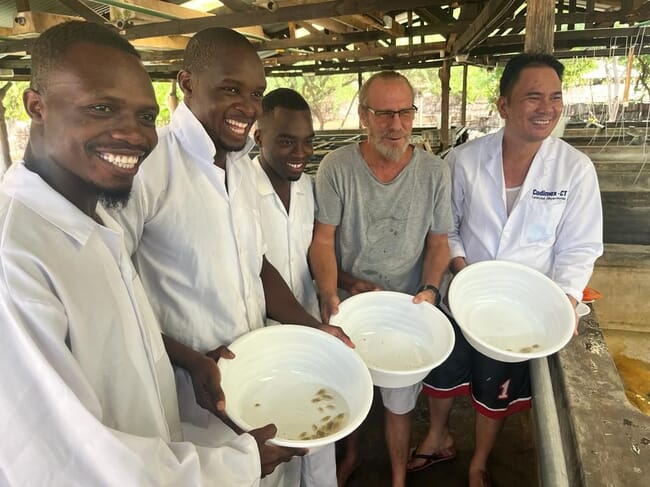
(From left to right) Timothy Kenga Sulubu, John Wekesa Wangila, Rodgers Kahindi Kalume, Justin Anierie and Edmar Bantolio © Crabs Alive
Justin Aniere, CEO of Crabs Alive, has been involved in mud crab (Scylla serrata) farming for over a decade, holding wild caught crabs in aquaculture facilities adjacent to his Che Shale Hotel in Kenya. After developing broodstock holding facilities and a hatchery, his team had tried for several years to produce crablets from the hatchery without any significant success.
However, in November – with support from Scylla, a mud crab consultancy group – the farm successfully produced its first batch of crablets from its hatchery. This was followed up with a second batch in December, with crablets settling just after Christmas.
“This exciting development is the first step in developing a new mud crab farming sector in Kenya for the benefit of our coastal communities,” explained Aniere in a press release. “Whilst early days, we are optimistic that Kenya can now join the list of countries farming mud crabs for both domestic and overseas markets.”
He added: “The professional support provided by Colin Shelley and his staff from Scylla mud crab consultancy has been critical to our success."
Crabs Alive’s success has also justified support from local and international organisations in aquaculture development in Kenya, including the FAO and the Kenya Marine Fisheries Socio-Economic Development (KEMFSED) project, which is supported by the World Bank.
The company has ambitious plans to expand its hatchery and nursery production facilities and work collaboratively with local community farmers to produce commercial quantities of mud crabs. It is hoping to be able to use some nearby ex-government aquaculture facilities for pond production of mud crabs, producing the first commercial quantities of farmed crabs in the country.
In addition, Crabs Alive is intending to work with the local Bahari Hai Conservation Group to support local mud crab fishery conservation efforts. Mud crab aquaculture needs access to reliable quantities of mature crabs for broodstock, therefore a healthy mud crab fishery is important until there is domestication of local stocks for farming.




